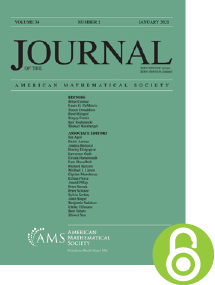Undecidability of linear inequalities in graph homomorphism densities
HTML articles powered by AMS MathViewer
- by Hamed Hatami and Serguei Norine
- J. Amer. Math. Soc. 24 (2011), 547-565
- DOI: https://doi.org/10.1090/S0894-0347-2010-00687-X
- Published electronically: December 3, 2010
- PDF | Request permission
Abstract:
The purpose of this article is to show that even the most elementary problems in asymptotic extremal graph theory can be highly non-trivial. We study linear inequalities between graph homomorphism densities. In the language of quantum graphs the validity of such an inequality is equivalent to the positivity of a corresponding quantum graph. Similar to the setting of polynomials, a quantum graph that can be represented as a sum of squares of labeled quantum graphs is necessarily positive. Lovász (Problem 17 in his manuscript Graph homomorphisms: Open problems) asks whether the opposite is also true. We answer this question and also a related question of Razborov in the negative by introducing explicit valid inequalities that do not satisfy the required conditions. Our solution to these problems is based on a reduction from real multivariate polynomials and uses the fact that there are positive polynomials that cannot be expressed as sums of squares of polynomials.
It is known that the problem of determining whether a multivariate polynomial is positive is decidable. Hence it is very natural to ask “Is the problem of determining the validity of a linear inequality between homomorphism densities decidable?” We give a negative answer to this question which shows that such inequalities are inherently difficult in their full generality. Furthermore we deduce from this fact that the analogue of Artin’s solution to Hilbert’s seventeenth problem does not hold in the setting of quantum graphs.
References
- Emil Artin, Über die Zerlegung definiter Funktionen in Quadrate, Abh. Math. Sem. Hamburg 5 (1927), 100–115.
- Béla Bollobás, Relations between sets of complete subgraphs, Proceedings of the Fifth British Combinatorial Conference (Univ. Aberdeen, Aberdeen, 1975) Congressus Numerantium, No. XV, Utilitas Math., Winnipeg, Man., 1976, pp. 79–84. MR 0396327
- Paul Erdős, László Lovász, and Joel Spencer, Strong independence of graphcopy functions, Graph theory and related topics (Proc. Conf., Univ. Waterloo, Waterloo, Ont., 1977) Academic Press, New York-London, 1979, pp. 165–172. MR 538044
- Michael Freedman, László Lovász, and Alexander Schrijver, Reflection positivity, rank connectivity, and homomorphism of graphs, J. Amer. Math. Soc. 20 (2007), no. 1, 37–51. MR 2257396, DOI 10.1090/S0894-0347-06-00529-7
- A. W. Goodman, On sets of acquaintances and strangers at any party, Amer. Math. Monthly 66 (1959), 778–783. MR 107610, DOI 10.2307/2310464
- David Hilbert, Ueber Büschel von binären Formen mit vorgeschriebener Functionaldeterminante, Math. Ann. 33 (1888), no. 2, 227–236 (German). MR 1510539, DOI 10.1007/BF01443853
- Yannis E. Ioannidis and Raghu Ramakrishnan, Containment of conjunctive queries: beyond relations as sets, ACM Trans. Database Syst. 20 (1995), no. 3, 288–324.
- Swastik Kopparty and Benjamin Rossman, The homomorphism domination exponent, European J. Combin. (to appear).
- T. Y. Lam, Introduction to quadratic forms over fields, Graduate Studies in Mathematics, vol. 67, American Mathematical Society, Providence, RI, 2005. MR 2104929, DOI 10.1090/gsm/067
- L. Lovász, Semidefinite programs and combinatorial optimization, Recent advances in algorithms and combinatorics, CMS Books Math./Ouvrages Math. SMC, vol. 11, Springer, New York, 2003, pp. 137–194. MR 1952986, DOI 10.1007/0-387-22444-0_{6}
- —, Graph homomorphisms: Open problems, manuscript (2008).
- László Lovász and Balázs Szegedy, Limits of dense graph sequences, J. Combin. Theory Ser. B 96 (2006), no. 6, 933–957. MR 2274085, DOI 10.1016/j.jctb.2006.05.002
- —, Random graphons and a weak positivstellensatz for graphs, arXiv.org:0902.1327 (2009).
- Ju. V. Matijasevič, The Diophantineness of enumerable sets, Dokl. Akad. Nauk SSSR 191 (1970), 279–282 (Russian). MR 0258744
- Alexander Prestel and Charles N. Delzell, Positive polynomials, Springer Monographs in Mathematics, Springer-Verlag, Berlin, 2001. From Hilbert’s 17th problem to real algebra. MR 1829790, DOI 10.1007/978-3-662-04648-7
- Alexander A. Razborov, Flag algebras, J. Symbolic Logic 72 (2007), no. 4, 1239–1282. MR 2371204, DOI 10.2178/jsl/1203350785
- —, On $3$-hypergraphs with forbidden $4$-vertex configurations,, manuscript (2008).
- Alexander A. Razborov, On the minimal density of triangles in graphs, Combin. Probab. Comput. 17 (2008), no. 4, 603–618. MR 2433944, DOI 10.1017/S0963548308009085
- Bruce Reznick, Some concrete aspects of Hilbert’s 17th Problem, Real algebraic geometry and ordered structures (Baton Rouge, LA, 1996) Contemp. Math., vol. 253, Amer. Math. Soc., Providence, RI, 2000, pp. 251–272. MR 1747589, DOI 10.1090/conm/253/03936
- Alfred Tarski, A Decision Method for Elementary Algebra and Geometry, The Rand Corporation, Santa Monica, Calif., 1948. MR 0028796
- Hassler Whitney, The coloring of graphs, Ann. of Math. (2) 33 (1932), no. 4, 688–718. MR 1503085, DOI 10.2307/1968214
Bibliographic Information
- Hamed Hatami
- Affiliation: Department of Mathematics, Princeton University, Princeton, New Jersey 08544
- Address at time of publication: School of Computer Science, McGill University, Montréal, Quebec, Canada
- Email: hatami@cs.mcgill.ca
- Serguei Norine
- Affiliation: Department of Mathematics, Princeton University, Princeton, New Jersey 08544
- Email: snorin@math.princeton.edu
- Received by editor(s): June 20, 2010
- Received by editor(s) in revised form: August 29, 2010
- Published electronically: December 3, 2010
- Additional Notes: The first author was supported in part by NSERC
The second author was supported in part by NSF under Grant No. DMS-0701033 - © Copyright 2010
American Mathematical Society
The copyright for this article reverts to public domain 28 years after publication. - Journal: J. Amer. Math. Soc. 24 (2011), 547-565
- MSC (2010): Primary 05C25, 05C35, 12L05
- DOI: https://doi.org/10.1090/S0894-0347-2010-00687-X
- MathSciNet review: 2748400


